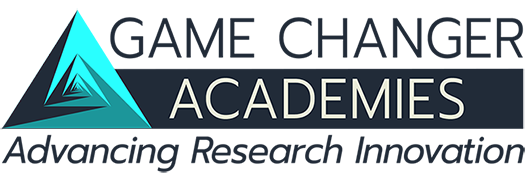GCA at NSF
CMMI’s Game Changer Academies
(C-GCA)
Our multi-year collaboration with the National Science Foundation’s CMMI division, known as C-GCA (CMMI’s Game Changer Academies), is dedicated to improving thinking, feedback, and results in peer review communications. C-GCA specifically focuses on enhancing panelist skills related to effective discussion, deliberation, and decision-making on NSF panels. We achieve these results through a comprehensive approach including online curriculum rooted in social science research and strategies, facilitated interactions with peers in small discussion groups, and experiential learning through role-plays and demonstrations to solidify their understanding.
The NSF’s rigorous funding process depends on rapid, yet thorough, deliberation and decision-making by expert panels. Through C-GCA, we work to maximize the quality of these crucial deliberations and promote high-value feedback to program officers. Our program empowers participants to engage in fair and reasonable discussions of complex arguments, quickly identify and address problematic group dynamics, and navigate discussions effectively across diverse career stages and disciplinary backgrounds.
Graduates of the C-GCA program (who we call “Panel Fellows”) are better equipped to contribute to the advancement of the United States as a global leader in science and engineering. As of December 2024, 682 members of the CMMI community have completed the C-GCA program.
You can read more about the program in this NSF news article: NSF invests in reviewer development to advance innovation
Rob Stone, CMMI Division Director, 2018-2022, describes the motivation for partnering with Kardia Group’s Game Changer Academies program as an investment in research innovation.
C-GCA Outcomes
Participant Readiness to Make a Difference in Panel Reviews
Before beginning C-GCA, and again at the conclusion of the program three months later, participants reviewed 16 scenarios describing common discussion challenges that can occur in a panel review.
The slides to the right show the percent of participants who said they are confident they could improve these situations.
















Real-World Application of C-GCA Skills
Over 90% of program graduates apply GCA skills in professional settings.
90% – in other interactions with colleagues
I feel that in discussions with other faculty, I have been better able to participate in discussions and slow down my thinking when presented with an opinion that I do not agree with.
I have applied a couple of discussion behaviors to my lab discussions. In particular, summarizing helped us a lot be on the same page and move forward.
73% – In faculty meetings
For faulty meetings and interactions with colleagues, I’ve learned to appreciate diverse perspectives, take time to think carefully to avoid cognitive shortcuts, and foster constructive conflict to benefit discussions.
In one faculty meeting we were discussing curriculum revision, some of my colleagues took others’ comments personally and ended up an unhappy ending of the discussion. After the meeting, I forwarded everyone a video I [saw during] GCA about 5 ways of approaching disagreement and conflict. I guess some of them got it and their behaviors in the following meetings were a little bit better.
65% – In other review contexts, e.g., promotion/tenure, graduate student admissions
When I am peer reviewing journal papers, I try to be aware of potential biases that might influence me to accept or reject a paper.
I am chairing an important committee for ASCE. The discussion sometime are emotional because members have different opinions on how to evaluate the accomplishments from practitioners vs academia’s. [Because of GCA], I know how to manage the discussion, how to encourage participations, and how to guide the committee to make a fair decision. This course is very helpful that helps me understand conflicts are common, and through a proper way, we can resolve the conflicts and move on with the agenda.
